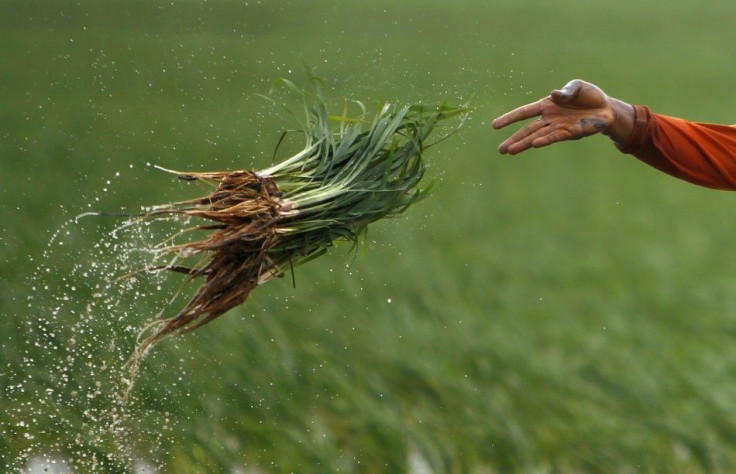Efforts to calm inflation disappoint farmers

India's efforts to calm inflation by allowing easier imports and restricting exports of key foodstuffs are disappointing farmers who are keen to exploit global high prices and say structural reforms are the way ahead.
The cost of food for families in Asia's third-largest economy has soared 17 percent over the past year, data showed on Thursday showed, boosted most recently by gains in onions and other everyday vegetables as harvests are hit by unseasonal rains.
Worldwide, food prices are touching record highs and worries about damage from poor weather have led to warnings that costs could rise still further, with shortages of key staples such as rice and sugar already biting.
World food prices hit a record high in January, the U.N. Food and Agriculture Organisation's Food Price Index showed on Thursday.
India's coalition government of Prime Minister Manmohan Singh, under pressure after a series of corruption scandals and with an eye on state elections this year, slapped an export ban on onions and removed import duty to ease the pain for consumers.
In the past few years, the government has also scrapped import taxes on sugar and lentils, and lowered duties on edible oils.
At the same time, to augment supplies in the local market, it has banned exports of non-basmati rice or common rice, wheat and lentils. Exports of sugar, cotton, aromatic rice and edible oils also face restrictions.
That is bad news for farmers in India, one of the world's biggest producers and consumers of food, who argue that the problem is not shortages of production but poor infrastructure and profit-taking.
The government is over-concerned about middle-class consumers. It is abruptly changing trade policy of farm commodities, which is hurting farmers, Raju Shetty, a farmers' leader and member of parliament from the regional Swabhimani Paksha party, told Reuters.
SUPPLY CHAIN WOES
Retailers agree that high prices in the market need a different approach to tame them.
An inefficient supply chain is stoking food price inflation. Consumers are paying higher prices, but farmers are not benefiting from it, said Shirish Deshpande, vice-chairman of the consumer forum Mumbai Grahak Panchayat.
The government should do more to check excessive profiting by middle men, he said.
Onion prices, for example, can triple in the distribution chain from field to table.
Farmers are also angry that the government failed to support them when harvests were bad and is now interfering to keep prices low for consumers.
The government is not giving us compensation for crop damage. Then it should allow prices to rise so we can recover some of the losses caused by last season's crop loss, said Sakahari, a 65-year-old onion farmer from Nashik, the biggest onion producing belt in the country in Maharashtra.
The Indian Sugar Mills Association (ISMA) has called on the government to allow 500,000 tonnes of unrestricted exports, to take advantage of high international prices.
ISMA's move echoes demands by sugar millers like Shree Renuka Sugars, Balrampur Chini, Bajaj Hindusthan and Triveni Engineering & Industries. They are struggling to pay farmers higher prices for cane due to lower sugar prices in the local market.
Sugar prices in India are hovering around $595 per tonne compared to levels around $845 for London futures .
Farmers in western Maharashtra state, the biggest producer of sugar, last October burned trucks and attacked sugar mills in protests demanding a higher price for their sugar cane.
Like sugar, farmers groups have also been demanding an increase in export quotas for cotton, which it set at 5.5 million bales for 2010/11 season that began on Oct. 1.
Indian cotton is cheaper by around a quarter if we compare it with international prices. The government should allow exports of surplus output, said Vijay Jawandhia, a farmers' leader, who organised a protest rally in Nagpur, Maharashtra, in January.
Wheat and rice exporters are also seeking concessions on the exports front as government-owned granaries are spilling over.
On Jan. 1, India's wheat stocks stood at 21.5 million tonnes against a target of 8.2 million tonnes. The rice inventory was 25.6 million tonnes versus a target of 11.8 million tonnes.
The government, with an eye on a rising budget deficit, is anxious to ensure stocks of such basic foodstuffs after a drought in 2009 forced it onto the global market to buy sugar at high prices.
The government should find out other ways to minimise the pinch of higher food prices. Banning exports and allowing duty-free imports is not a solution. It will not help in the longer term in raising local production, said a senior official at a multi-national grains trader.
© Copyright Thomson Reuters 2024. All rights reserved.





















